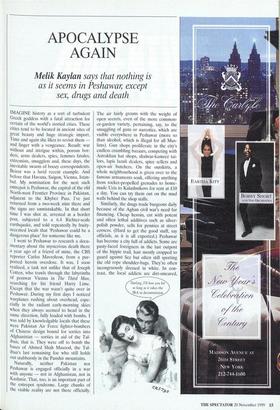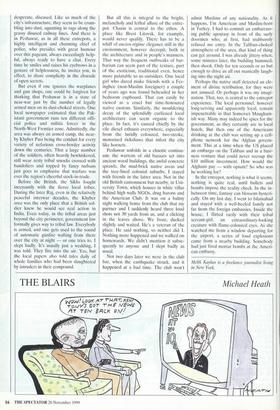APOCALYPSE AGAIN
Melik Kaylan says that nothing is as it seems in Peshawar, except sex, drugs and death
IMAGINE history as a sort of turbulent Greek goddess with a fatal attraction for certain of the world's storied cities. These cities tend to be located in ancient sites of great beauty and huge strategic import. Time and again she likes to revisit them and linger with a vengeance. Result: war without and intrigue within, porous bor- ders, arms dealers, spies, femmes fatales, extremists, smugglers and, these days, the Inevitable swarm of boozy correspondents. Beirut was a lurid recent example. And before that Havana, Saigon, Vienna, Istan- bul. My nomination for the next such entrepot is Peshawar, the capital of the old North-west Frontier Province in Pakistan, adjacent to the Khyber Pass. I've just returned from a two-week stint there and the signs are unmistakable. In that short time I was shot at, arrested at a border Post, subjected to a 6.4 Richter-scale earthquake, and told repeatedly by fruity- accented locals that 'Peshawar could be a dangerous place' for someone like me.
I went to Peshawar to research a docu- mentary about the mysterious death there a year ago of a friend of mine, the CBS reporter Carlos Mavroleon, from a pur- ported heroin overdose. It was, I soon realised, a task not unlike that of Joseph Cotten, who trawls through the labyrinths of postwar Vienna in The Third Man, searching for his friend Harry Lime. Except that the war wasn't quite over in Peshawar. During my first days I noticed warplanes rushing about overhead, espe- cially in the radiant early-morning skies when they always seemed to head in the same direction, fully loaded with bombs, I was told by knowledgable locals that these were Pakistan Air Force fighter-bombers of Chinese design bound for sorties into Afghanistan — sorties in aid of the Tal- iban, that is. They were off to bomb the bases of Ahmed Shah Masood, the Tal- Iban's last remaining foe who still holds out stubbornly in the Panshir mountains.
Naturally, neither Pakistan nor Peshawar is engaged officially in a war with anyone — not in Afghanistan, not in Kashmir. That, too, is an important part of the entrepot syndrome. Large chunks of the visible reality are not there officially.
The air fairly groans with the weight of open secrets, even of the more common- or-garden variety, pertaining, say, to the smuggling of guns or narcotics, which are visible everywhere in Peshawar (more so than alcohol, which is illegal for all Mus- lims). Gun shops proliferate in the city's endless crumbling bazaars, competing with Astrakhan hat shops, shalwar-kameez tai- lors, lapis lazuli dealers, spice sellers and open-air butchers. On the outskirts, a whole neighbourhood is given over to the famous armaments souk, offering anything from rocket-propelled grenades to home- made Uzis to Kalashnikovs for rent at £10 a day. You can try them out on the mud walls behind the shop stalls.
Similarly, the drugs trade burgeons daily because of the Aghan civil war's need for financing. Cheap heroin, cut with potent and often lethal additives such as silver- polish powder, sells for pennies at street corners. (Hard to get the good stuff, say officials, as it is all exported.) Peshawar has become a city full of addicts. Some are pasty-faced foreigners in the last outpost of the hippie trail, hair mostly cropped to guard against lice but often still sporting the old rope shoulder-bags. They're often incongruously dressed in white. In con- trast, the local addicts are dirt-smeared,
desperate, diseased. Like so much of the city's infrastructure, they seem to be crum- bling into dust, squatting in rags along the grassy disused railway lines. And, there is in Peshawar, as in all these entrepots, a highly intelligent and charming chief of police, who presides with great humour over this pageant, always exceedingly help- ful, always ready to have a chat. Every time he smiles and raises his eyebrows in a gesture of helplessness, he invites you, in effect, to share complicity in the charade of open secrets.
But even if one ignores the warplanes and gun shops, one could be forgiven for thinking that Peshawar is in a state of near-war just by the number of legally armed men on its dust-choked streets. One local newspaper estimated that the Pak- istani government runs ten different offi- cial police and militia forces in the North-West Frontier zone. Admittedly, the area was always an armed camp, the near- by Khyber Pass being the conduit for every variety of nefarious cross-border activity down the centuries. That a large number of the soldiers, often heavily bewhiskered, still wear zesty tribal smocks crossed with bandoliers and topped by fancy turbans just goes to emphasise that warfare was ever the region's cheerful stock-in-trade.
Before the British, the Sikhs fought incessantly with the fierce local tribes. During the later Raj, even in the relatively peaceful interwar decades, the Khyber area was the only place that a British sol- dier knew he would see real action in India. Even today, in the tribal areas just beyond the city perimeter, government law formally gives way to tribal law. Everybody is armed, and one gets used to the sound of automatic gunfire wafting from there over the city at night — or one tries to. I slept badly. It's usually just a wedding, I was told. They fire into the air. Yes, but the local papers also told tales daily of whole families who had been slaughtered by intruders in their compound.
But all this is integral to the bright, melancholy and lethal allure of the entre- pot. Charm is central to the ethos. A place like Brest Litovsk, for example, would never qualify. There has to be a whiff of ancien-regime elegance still in the environment, however decrepit, both in the architecture and in people's manners. That way the frequent outbreaks of bar- barism can seem part of the texture, part of the exoticism, traditional even, hence more palatable to us outsiders. One local girl who dared make friends with a Fer- inghee (non-Muslim foreigner) a couple of years ago was found beheaded in her bedroom cupboard. That can easily be viewed as a cruel but time-honoured native custom. Similarly, the mouldering decay of the splendidly curlicued local architecture can seem organic to the place. In fact, it's caused chiefly by the vile diesel exhaust everywhere, especially from the luridly coloured, two-stroke, motorised rickshaws that infest the city like hornets.
Peshawar unfolds in a chaotic continu- um: the warrens of old bazaars set into ancient wood buildings, the awful concrete sprawls, the mud-brick native areas and the tree-lined colonial suburbs. I stayed with friends in the latter area. Not in the old British cantonment but nearby, in Uni- versity Town, which houses in white villas behind high walls NGOs, drug barons and the American Club. It was on a balmy night walking home from the club that my partner and I suddenly heard three loud shots not 30 yards from us, and a clicking in the leaves above. We froze, ducked slightly and waited. He's a veteran of the place. He said nothing, so neither did I. Nothing more happened and we walked on homewards. We didn't mention it subse- quently to anyone and I slept badly as usual.
Not two days later we were in the club bar, when the earthquake struck, and it happened at a bad time. The club won't admit Muslims of any nationality. As it happens, I'm American and Muslim-born in Turkey. I had to commit an embarrass- ing public apostasy in front of the surly doormen who, at first, had stubbornly refused me entry. In the Taliban-choked atmosphere of the arca, that kind of thing can get around. I was already jittery when. some minutes later, the building hummed, then shook. Only for ten seconds or so but enough to drive us all out manically laugh- ing into the night air.
Perhaps the native staff detected an cle- ment of divine retribution, for they were not amused. Or perhaps it was thy imagi- nation. That, too, is central to the entrepot experience. The local personnel, however long-serving and apparently loyal, remain impenetrable in that Somerset Maugham- ish way. Many may indeed be spies for the government, as they certainly are in local hotels. But then one of the Americans drinking at the club was setting.up a cell- phone network for the Afghan govern- ment. This at a time when the US placed an embargo on the Taliban and in a busi- ness venture that could never recoup the $10 million investment. How would the Afghans pay — with opium? So who was he working for?
In the entrepot, nothing is what it seems, nothing is quite real, until bullets and bombs impose the reality check. In the in- between time, fantasy can blossom hysteri- cally. On my last day, I went to Islamabad and stayed with a well-heeled family not far from the foreign embassies. Inside the house, I flirted racily with their tribal servant-girl, an extraordinary-looking creature with flame-coloured eyes. As she watched me from a window departing for the airport, a series of loud explosions came from a nearby building. Somebody had just fired mortar bombs at the Ameri- can embassy.
Melik Kaylan is a freelance journalist firing in New York.



























































































 Previous page
Previous page